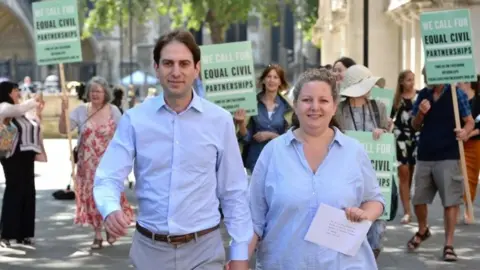Heterosexual couple win civil partnership case
A heterosexual couple have won their legal bid for the right to have a civil partnership instead of a marriage.
The Supreme Court unanimously ruled in favour of Rebecca Steinfeld, 37, and Charles Keidan, 41, from London.
The court said the Civil Partnership Act 2004 - which only applies to same-sex couples - is incompatible with the European Convention on Human Rights.
Ms Steinfeld said she hoped the government does the "right thing" and extends civil partnerships to all.
"We are feeling elated," she told the BBC outside court. "But at the same time we are feeling frustrated the government has wasted taxpayers' money in fighting what the judges' have called a blatant inequality."
The judgement does not oblige government to change the law, although it does make it more likely that the government will now act, the BBC's legal correspondent Clive Coleman explained.
In a civil partnership, a couple is entitled to the same legal treatment in terms of inheritance, tax, pensions and next-of-kin arrangements as marriage.
The couple, who met in 2010 and have two children, said the "legacy of marriage" which "treated women as property for centuries" was not an option for them.
"We want to raise our children as equal partners and feel that a civil partnership - a modern, symmetrical institution - sets the best example for them," they explained.
Since March 2014, same sex-couples can choose whether to enter a civil partnership or to marry. This has not been possible for mixed-sex couples, which led Ms Steinfeld and Mr Keidan to argue that the law was discriminatory.
This ruling overturns a previous judgement made by the Court of Appeal, which rejected the couple's claim, in February of last year.

What does a civil partnership offer?
- Legal and financial protection for both parties in the event of the relationship ending, like in marriage
- It is free of the religious connotations of marriage
- Some object to marriage as an institution and its associations with property and patriarchy

The judges ruled that current UK law was "incompatible" with human rights laws on discrimination and the right to a private and family life.
Announcing the court's decision, Lord Kerr said the government did not seek to justify the difference in treatment between same-sex and different sex couples.
"To the contrary, it accepts that the difference cannot be justified," he said.
LGBT and human rights campaigner Peter Tatchell called the ruling a "victory for love and equality".
"It was never fair that same-sex couples had two options, civil partnerships and civil marriages, whereas opposite-sex partners had only one option, marriage," he said.

Analysis
By BBC legal correspondent, Clive Coleman
 PA
PAIt is an irony that the way in which relationship equality for same sex couples came about in the 21st century had the effect of creating inequality between them and different sex couples.
The Civil Partnership Act 2004 created civil partnerships but defined them as a 'relationship between two people of the same sex'.
When the Marriage (Same Sex Couples) Act 2013 legalised same sex marriage, gay couples had two options as to how to formalise their relationship in law - marriage or civil partnership - whereas heterosexual couples could only marry.
The Supreme Court has found that inequality to amount to discrimination and a breach of the right to a family life.
The government accepted the inequality between same sex and different sex couples, but argued that it needed to have time to assemble sufficient information to allow a confident decision to be made about the future of civil partnerships.
Lord Kerr gave that argument short shrift, saying: "What it (the government) seeks is tolerance of the discrimination while it sorts out how to deal with it. That cannot be characterised as a legitimate aim."

The couple will later go to Whitehall to deliver a letter to Equalities Minister Penny Mordaunt.
Martin Loat, chairman of the Equal Civil Partnerships campaign, said: "There is only one possible way forward - giving everyone the right to a civil partnership - and we urge the government to seize this opportunity to announce it will end this injustice now."
More than 130,000 people have signed an online petition in support of civil partnerships for everyone.
The couple's barrister Karon Monaghan QC told the court her clients had "deep-rooted and genuine ideological objections to marriage" and are "not alone" in their views.
There are around 63,000 couples in civil partnerships in the UK and some 3.3 million co-habiting couples.
